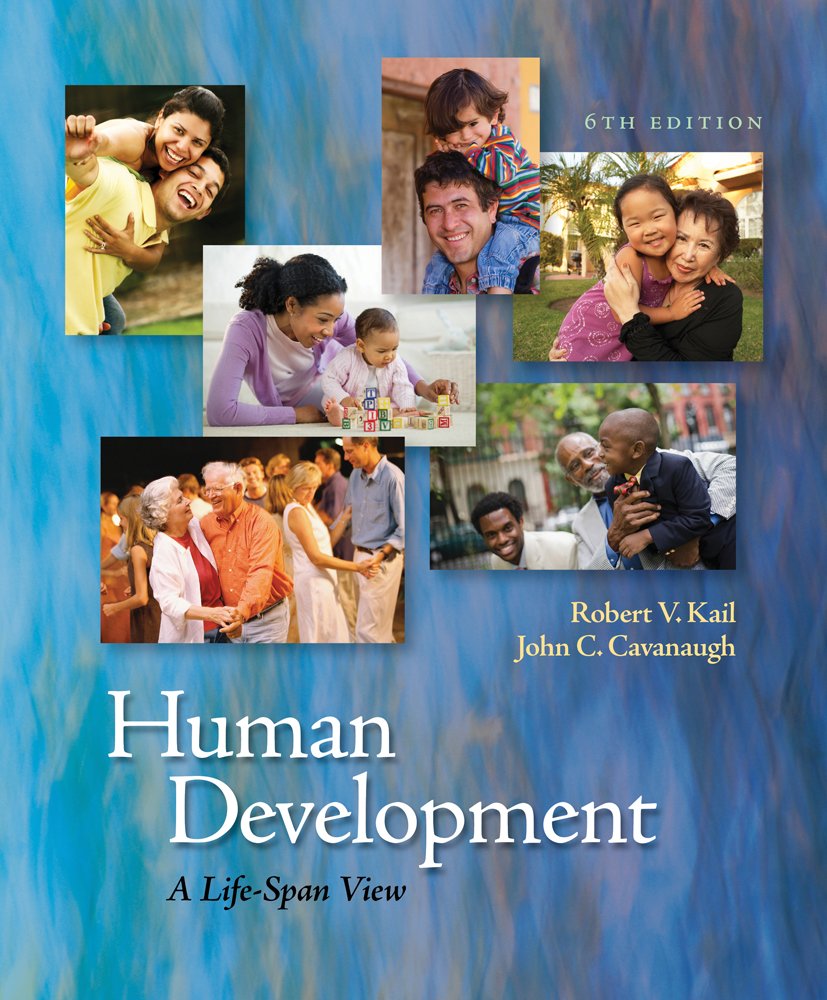In Stock
Human Development A Life Span View 6th Edition By Kail -Test Bank
Human Development: A Life-Span View, 6th Edition by Kail offers a comprehensive examination of human development across the lifespan. Buy this edition to access updated theories, research, and practical insights into developmental stages from infancy to late adulthood, enhancing your understanding of human growth and development.
Digital item No Waiting Time Instant DownloadISBN-10: 1133394892 ISBN-13: 978-1133394891Publisher: Cengage Learning; 6th editionAuthors: Robert V. Kail, John C. Cavanaugh
Original price was: $55.00.$27.00Current price is: $27.00.
Human Development A Life Span View 6th Edition By Kail -Test Bank
MULTIPLE CHOICE
1.Who is most likely interested in the study of human development?
|
a. |
Dr. Harvey, who studies the brain cells of infants |
|
b. |
Dr. Hatfield, who studies eating disorders |
|
c. |
Dr. Deal, who studies how political attitudes change with age |
|
d. |
Dr. Hersh, who studies elderly patients with Alzheimer’s disease |
ANS: C DIF: Easy REF: 1.1 OBJ: 1.1
KEY: Key Term MSC: Application
2.Which most accurately reflects the nature of the scientific study of human development?
|
a. |
Multidisciplinary |
|
b. |
Focus on groups, not individuals |
|
c. |
Nontheoretical |
|
d. |
Emphasis on stability over change |
ANS: A DIF: Easy REF: 1.1 OBJ: 1.1
KEY: Key Term MSC: Conceptual
3.Which question best captures the spirit of most individuals who study human development with regard to the nature/nurture question?
|
a. |
How do genes and environmental factors interact in the development of memory processes? |
|
b. |
Which human behaviors are determined genetically, and which are determined by environmental factors? |
|
c. |
At what age do environmental factors surpass genetic factors as most important in human development? |
|
d. |
Which genes are responsible for childhood behavior, and which genes are responsible for adult behavior? |
ANS: A DIF: Difficult REF: 1.1 OBJ: 1.1
MSC: Conceptual
4.Which term does not belong in this group?
|
a. |
Experiential |
|
b. |
Nurture |
|
c. |
Environmental |
|
d. |
Hereditary |
ANS: D DIF: Difficult REF: 1.1 OBJ: 1.1
KEY: Key Term MSC: Conceptual
5.Since Dr. Kim takes a strong nature position concerning the origins of mental
retardation, she would most likely hypothesize that her son’s mental retardation is due to
|
a. |
her parenting style. |
|
b. |
his genes. |
|
c. |
his exposure to a toxic chemical prior to birth. |
|
d. |
random chance. |
ANS: B DIF: Moderate REF: 1.1 OBJ: 1.1
KEY: Key Term MSC: Application
6.The notion that development is best described in terms of a series of abrupt shifts in behavior best fits with the _____ approach.
|
a. |
Nature |
|
b. |
Nurture |
|
c. |
continuity |
|
d. |
discontinuity |
ANS: D DIF: Easy REF: 1.1 OBJ: 1.1
KEY: Key Term MSC: Factual
7.When discussing child development, Olaf uses terms like the “terrible 2s” and the “tranquil 3s.” These ideas are most compatible with a ____ view.
|
a. |
context-specificity |
|
b. |
hereditary |
|
c. |
continuity |
|
d. |
discontinuity |
ANS: D DIF: Moderate REF: 1.1 OBJ: 1.1
KEY: Key Term MSC: Application
8.Dr. Fletcher is attempting to determine whether adult criminals were rule breakers throughout their childhood, or whether they suddenly turned to a life of crime. Her research is most concerned with which issue of human development?
|
a. |
Nature versus nurture |
|
b. |
Universal versus context-specific development |
|
c. |
Biological versus sociocultural forces |
|
d. |
Continuity versus discontinuity |
ANS: D DIF: Moderate REF: 1.1 OBJ: 1.1
KEY: Key Term MSC: Application
9.Yacef is interested in determining whether children develop virtually the same way in Algeria as they do in other parts of the world. Yacef’s research deals primarily with the ____________ issue of human development.
|
a. |
psychological versus biological forces |
|
b. |
universal versus context-specific development |
|
c. |
nature versus nurture |
|
d. |
continuity versus discontinuity |
ANS: B DIF: Easy REF: 1.1 OBJ: 1.1
KEY: Key Term MSC: Application
10.Sara believes that memory processes develop the same way in all children. Sara is most likely to support a _____ position regarding human development.
|
a. |
universal |
|
b. |
nurture |
|
c. |
discontinuous |
|
d. |
non-normative |
ANS: A DIF: Easy REF: 1.1 OBJ: 1.1
KEY: Key Term MSC: Application

Reviews
There are no reviews yet.